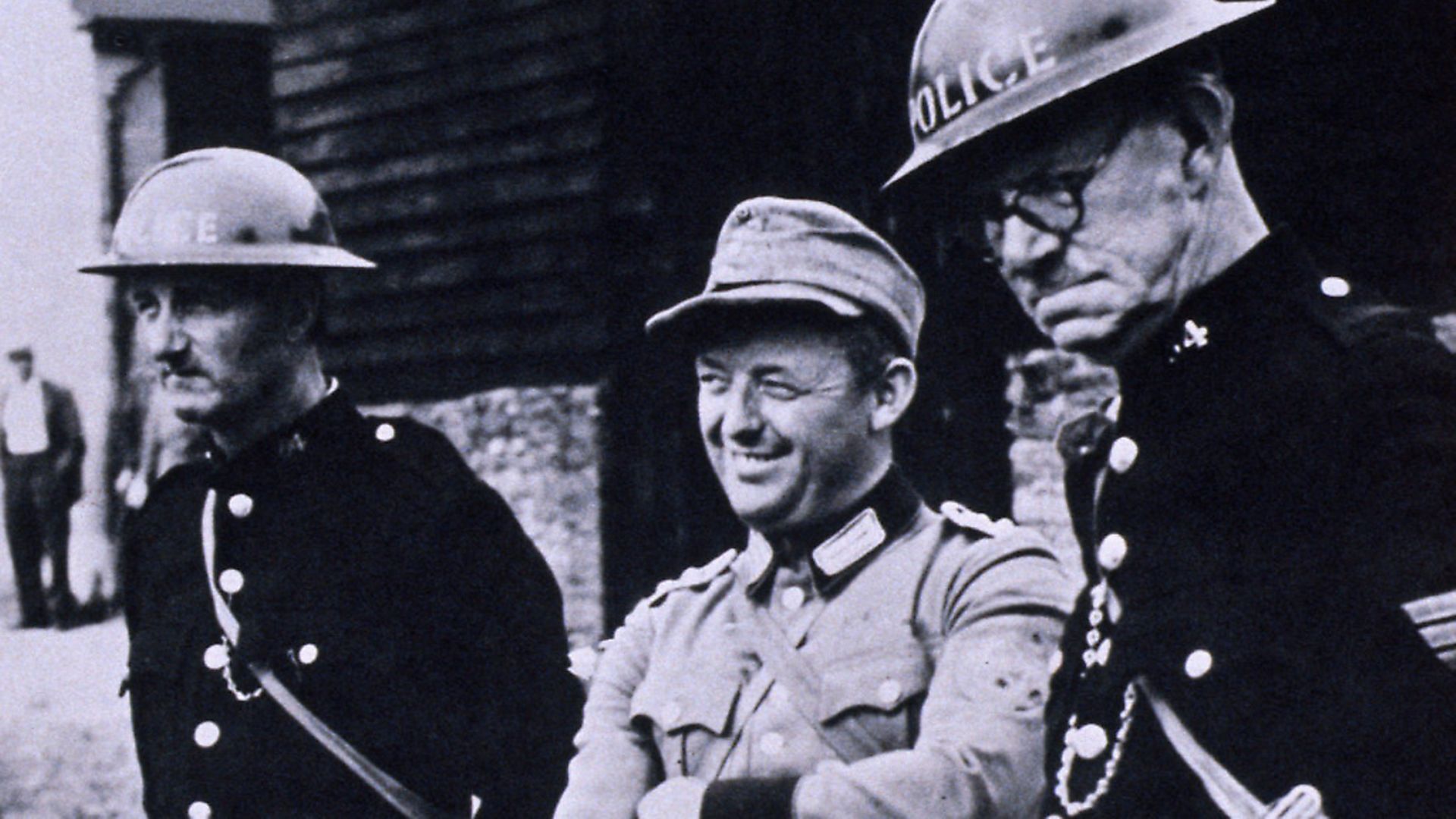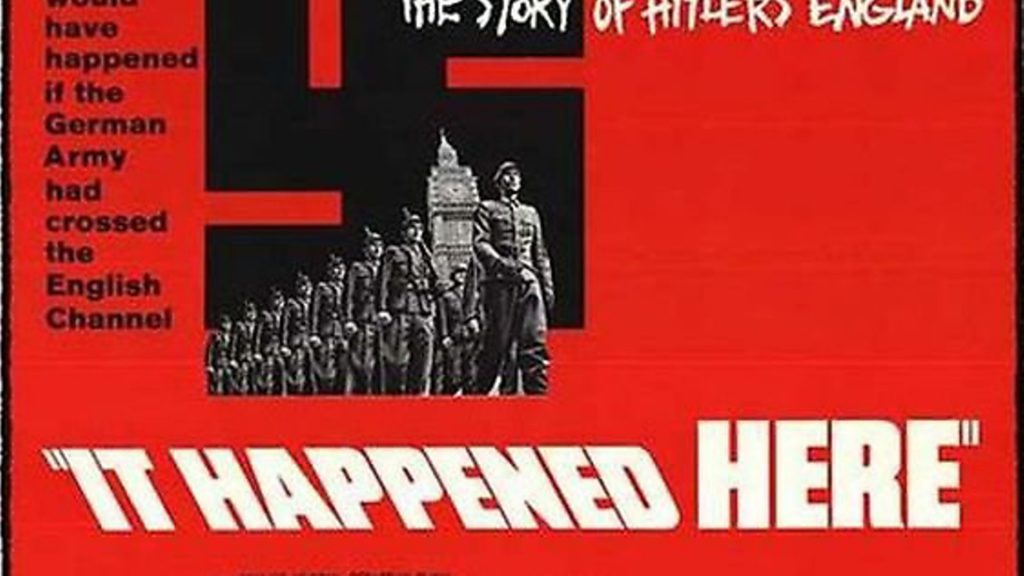
Roger Domeneghetti looks back on a controversial movie that questioned Britain’s self-assured complacency and imagined a Nazi ascendency here.

British exceptionalism is a concept that has long been at the heart of the county’s national sense of self. In the current climate it is pro-Brexiters who most vociferously claim its legacy, perhaps best encapsulated by Tory MP Mark Francois’s verbose and jingoistic claim: “My father was a D-Day veteran. He never submitted to bullying by any German and neither will his son.”
However, this myth of the distinctive British character, which colours our narrow nationalistic understanding of both the Second World War and much of Anglo-European relations since, was challenged by a little known but highly acclaimed and highly controversial film released 55 years ago.
Set in England in 1944 following the successful execution four years earlier of Operation Sea Lion – the Nazis’ plan to invade Britain (which was in reality postponed after the Battle of Britain) – It Happened Here has been described by the BFI as “one of cinema’s most alarming alternative histories”.
As such it is part of a long lineage of books and films which focused on imagining a German victory – or, at least, an invasion of Britain – in the Second World War stretching from Alberto Cavalcanti’s Went the Day Well?, released in 1942, through to Robert Harris’ Fatherland and Amazon’s recent adaptation of Philip K Dick’s The Man in the High Castle.
However, the shock value of It Happened Here comes not from the idea that the Germans might have successfully invaded Britain. Instead, the film’s message is that given the right circumstances far-right extremism would become the mainstream, and fascist ideology would permeate society to the point of banal normality.
The film was conceived in 1956 by Kevin Brownlow when he was an 18-year-old trainee working for World Wide Pictures. One day on his way to the Soho-based documentary production company, he saw two men leap out of a car and run into a shop, all the time shouting at each other in German. It seemed to the youngster as if a scene from a Second World War movie was playing out in front of him, but in London, and it prompted him to ask himself: “What might have happened if the Germans had invaded England?”
Soon he had drawn up a one-page treatment for the film and linked up with Andrew Mollo, a 16-year-old art student who collected military uniforms and had an interest in working in the film industry. The pair spent the next eight years realising their vision.
Despite the tender ages of the two co-directors, and their shoestring budget of £21,000, this was no sixth form school project. They had some high-profile help from Stanley Kubrick, who gave them spare film left over from Dr Strangelove, and Tony Richardson, on the verge of his Oscar win for directing Tom Jones, who gave them £3,000.
Some 900 volunteers gave up their time for free to appear in the film and many involved with the production behind the camera would go on to have long and acclaimed cinema careers. Brownlow himself received an honorary lifetime achievement Oscar in 2010 for his work in cinema preservation. Mollo, along with his brothers, set up a company that advises film makers on military history, and lent his expertise to movies such as The Eagle Has Landed, The Pianist and Downfall.
It Happened Here derives its strength from its documentary feel. The story is interspersed with fictional newsreel footage and Nazi propaganda films, all produced with an incredible attention to detail. Brownlow and Mollo used the photobook À Paris sous la Botte des Nazis, which documented the German occupation of the French capital, as inspiration.
They replicated the infamous image of German troops marching up the Champs Elysees with actors in German army uniforms striding past Big Ben. In other scenes Nazi officers flirt with English women, mingle with English police officers and take photos of themselves in front the Albert Memorial, like tourists. The juxtaposition of German military symbolism with British landmarks creates an image that is surreal and unnerving in equal measure.
The focus of the film is Pauline, a nurse from Salisbury who is evacuated to a demilitarised London. There, despite her reluctance, she decides to co-operate with the occupying forces, arguing: “We’ve fought a war and we’ve lost it. The only way to get back to normal is to support law and order.” The sentiment of her ‘Keep Calm and Carry On’ philosophy has an echo half a century later in the arguments of those who just want to get on and leave the EU, deal or no deal.
Pauline joins the Nazi-controlled Immediate Action Organisation and is eventually deployed to a country hospital which, she discovers to her horror, is an extermination centre for Slavic immigrants. Arrested by the SS for refusing to co-operate, she is eventually captured by the English Army of Liberation and sent to a field hospital to tend to wounded partisans.
As such, it is not a war film in the traditional sense but one focused on the physiological effects of occupation. Pauline’s actions are neither good nor bad, but are instead motivated simply by her will to survive.
Yet while the film depicts partisans fighting the Nazis they are a minority. The majority of the population collaborate with the occupying force. The English SS work alongside their German counterparts, differentiated only by their arm patches displaying the Cross of St George below the eagle and swastika.
The film’s title was, Brownlow later suggested, inspired by the wartime cliche ‘it couldn’t happen here’. He wanted to question the notion of British exceptionalism as articulated in the immediate post-war years – the idea that somehow the country’s response to invasion would have been different from that seen in Vichy France and other occupied countries.
Not surprisingly, the notion that fascist tendencies lie just beneath the surface of British society was heavily criticised on its release.
Even more controversial was a six-minute unscripted scene in which former members of Oswald Mosley’s British Union of Fascists, playing collaborators, espoused their beliefs on a range of subjects including “the Jewish problem”. Brownlow and Mollo’s aim was “to bring their sickness into the open and [let them] condemn themselves out of their own mouths”. However, they were accused of anti-Semitism.
The scene was cut by the distributors United Artists despite Brownlow’s protestations, which were echoed by critics like Kenneth Tynan, who argued that it showed “that views of such monstrous intensity are still rife in certain quarters today”. Fascists were not goose-stepping cartoonesque villains nor did they speak only with German accents; they were portly English chaps sat in the Red Lion with a pint in one hand and a fag in the other.
The damage was done, however. Following a brief but successful run, the film was withdrawn for 30 years before being re-released in 1994 with the offending scene restored. Speaking in 1999 for an article in the Journal of Dramatic Theory and Criticism, Brownlow was unrepentant, arguing that the film’s central message had been borne out over time.
“English audiences were upset by the whole idea that the English could be capable of collaborating with the Nazis. I think we now realise it is possible that fascism could have flourished here; that it could rise again at anytime, anywhere.”









